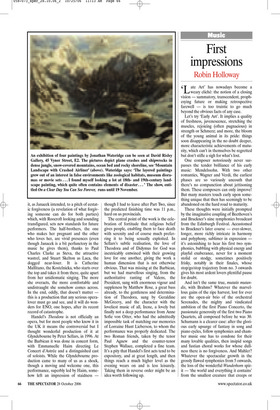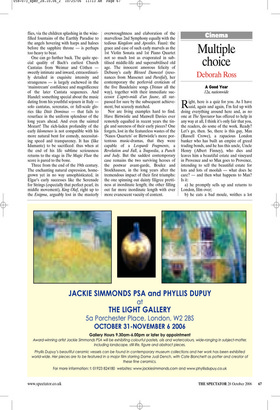First impressions
Robin Holloway
‘Late Art’ has nowadays become a weary cliché: the notion of a closing vision — summatory, transcendent, prophesying future or making retrospective farewell — is too truistic to go much beyond the obvious facts of any case.
Let’s try ‘Early Art’. It implies a quality of freshness, juvenescence, stretching the muscles, rejoicing (often pugnacious) in strength or Schmerz; and more, the bloom of the young animal in its pride: things soon disappearing in the no doubt deeper, more characteristic achievements of maturity, which can’t in themselves be regretted but don’t stifle a sigh for what’s lost.
One composer notoriously never surpasses the tender brilliance of his early music: Mendelssohn. With two other romantics, Wagner and Verdi, the earliest phases are so variously uncouth that there’s no compunction about jettisoning them. These composers can only improve! But many masters touch early upon something unique that then has seemingly to be abandoned on the hard road to maturity.
These thoughts were initially prompted by the imaginative coupling of Beethoven’s and Bruckner’s nine symphonies broadcast from the Edinburgh Festival. Accustomed to Bruckner’s later course — ever-slower, longer, more richly intricate in harmony and polyphony, sublimer in expression — it’s astonishing to hear his first two symphonies, bubbling with physical energy and playful exuberance, never for a moment stolid or stodgy, sometimes positively frisky, notably in their finales, whose stop/go/stop trajectory from no. 3 onwards gives his most ardent lovers plentiful pause for doubt.
And isn’t the same true, mutatis mutandis, with Brahms? Whatever the marvellous gains of the ripe harvest, lost for ever are the open-air brio of the orchestral Serenades, the mighty and vindicated ambition of the first Piano Concerto, the passionate generosity of the first two Piano Quartets, all composed before he was 30. Schumann is a clearer case: after the glorious early upsurge of fantasy in song and piano cycles, follow symphonies and chamber music one has to condone for their many lovable qualities, then insipid songs and fustian choral works for whose dullness there is no forgiveness. And Mahler? Whatever the spectacular growth in the grossly flawed symphonies from 5 onwards, the loss of the wonderful Wunderhorn spirit — ‘the world and everything it contains’ from the smallest creature that creeps or flies, via the children splashing in the winefilled fountains of the Earthly Paradise to the angels hovering with harps and haloes before the sapphire throne — is perhaps too heavy to bear.
One can go further back. The quite special quality of Bach’s earliest Church Cantatas from Weimar and Cöthen sweetly intimate and inward, extraordinarily detailed in exquisite intensity and strangeness — is largely eschewed in the ‘mainstream’ confidence and magnificence of the later Cantata sequences. And Handel: something special about the music dating from his youthful sojourn in Italy solo cantatas, serenatas, or full-scale glories like Dixit Dominus — that fails to resurface in the uniform splendour of the long years ahead. And even the sainted Mozart! The rich-laden profundity of the early Idomeneo is not compatible with his more natural bent for comedy, necessitating speed and transparency. It has (like Idamante) to be sacrificed: thus when at the end of his life sublime seriousness returns to the stage in The Magic Flute the score is pared to the bone.
Three from the end of the 19th century. The enchanting natural expression, homegrown yet in no way unsophisticated, in Elgar’s early successes like the Serenade for Strings (especially that perfect pearl, its middle movement), King Olaf, right up to the Enigma, arguably lost in the masterly overwroughtness and elaboration of the marvellous 2nd Symphony equally with the tedious Kingdom and Apostles. Fauré: the grace and ease of such early marvels as the 1st Violin Sonata and 1st Piano Quartet not so much lost as evaporated in subtilised middle-life and supersubtilised old age. The innocent amorous felicity of Debussy’s early Blessed Damozel (resonances from Massenet and Parsifal), her contemporary the perfervid eroticism of the five Baudelaire songs (Tristan all the way), together with their immediate successor L'après-midi d’un faune, all surpassed for sure by the subsequent achievement, but scarcely matched.
Nor are living examples hard to find. Have Birtwistle and Maxwell Davies ever remotely equalled in recent years the tingle and sureness of their early pieces? One forgets, lost in the featureless wastes of the ‘Naxos Quartets’ or Birtwistle’s more portentous music-dramas, that they were capable of a Leopardi Fragments, a Revelation and Fall, a Tragoedia, a Punch and Judy. But the saddest contemporary case remains the two surviving heroes of the postwar avant-garde, Boulez and Stockhausen, in the long years after the tremendous impact of their first triumphs: the one spinning out dainty filigree prettiness at inordinate length; the other filling out far more inordinate length with ever more evanescent vacuity of content.



























































































 Previous page
Previous page